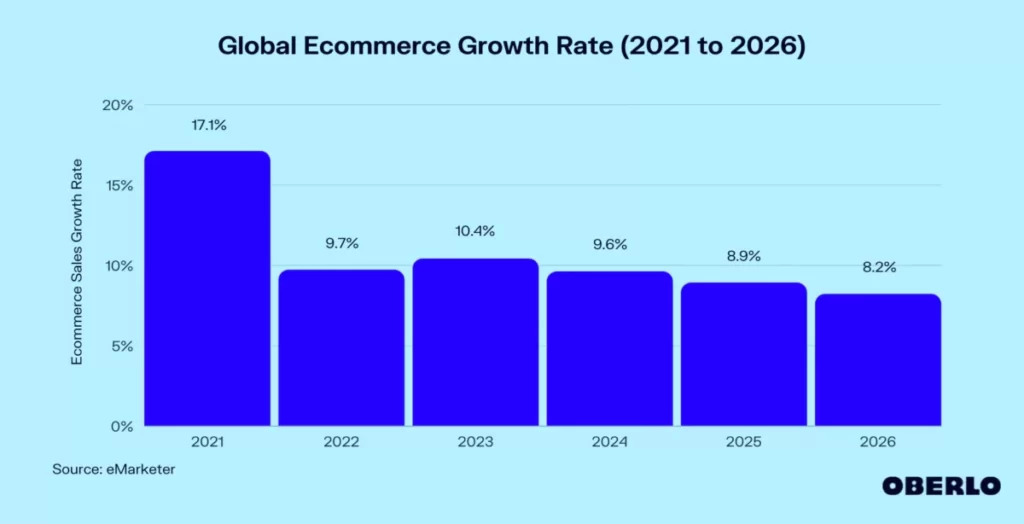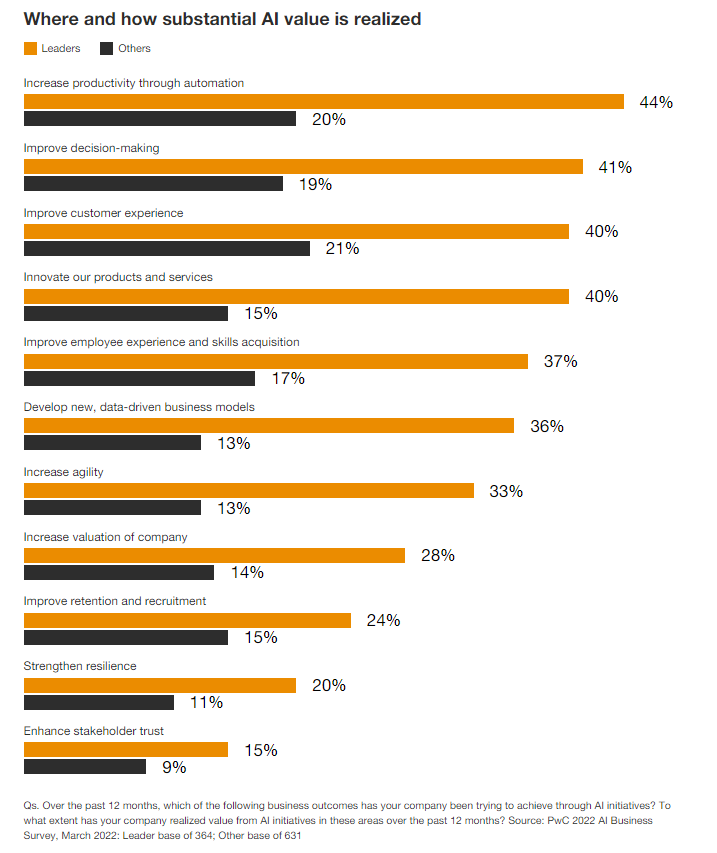The eCommerce industry is evolving at an extraordinary rate. It’s projected that this year, the global eCommerce growth rate will reach 10.4%, which is estimated to be $6.3 trillion in global sales. Furthermore, online shopping is expected to grow exponentially in the US, jumping from 2022’s $907.9 billion to $1.4 trillion in 2025.

Source: oberlo.com
While it seems like eCommerce businesses are on a steady path to continuous growth, they’re faced with a fair share of hurdles, one of which is increased competition. The surge of new eCommerce businesses has made it more challenging for business owners to cut through the noise and get their business in front of their target audience.
How can businesses continue to adapt and accommodate changing customer needs and expectations?
Leveraging technology is one way for businesses to gain competitive advantage. Technological developments, such as artificial intelligence, blockchain technology, and natural language processing, are already changing the way we approach businesses and industries, including influencer marketing and eCommerce.
The use of AI is an emerging trend that eCommerce business owners are happy to jump on. In fact, 51% of eCommerce companies are employing AI to provide their audience with a smooth user experience.
Artificial intelligence, in particular, has permeated different aspects of our daily lives, from automating workflows and helping us create content faster to bolstering marketing efforts and providing richer and more unique experiences to consumers.
Artificial Intelligence and eCommerce: How AI Is Reshaping the Future of Business:
The Role of Artificial Intelligence in the eCommerce Industry
According to PwC, companies that employ a holistic approach to AI by focusing on three key aspects, namely business transformation, enhanced decision-making, and systems modernization, are far more likely to succeed in leveraging the technology for growth.
The same business survey also highlights how 36% of these so-called AI leaders report widespread adoption of the technology and how they’re more likely to report gaining substantial value from using AI in their operations. Some of the key values that AI brings to these companies include enhanced productivity thanks to automation and improvements in business-critical aspects such as decision-making, customer experience, and product or service innovation.

Source: pwc.com
While AI may seem like a cool addition to any business, implementing it into your own eCommerce business has far-reaching implications. Yes, AI is a useful tool for optimizing operations and driving sales. However, without an understanding of what it is and how its components work, it can be challenging for businesses to leverage AI for growth.
What factors are contributing to the increased adoption of AI?
According to Oracle, there are three main factors worth looking at:
- Increased availability of high-performance computing power
- The availability of large data volumes
- The competitive advantage the AI adoption brings
However, these don’t necessarily mean that AI is already widely adopted by enterprises. While the barriers to entry may be lower, there are several hurdles to operationalizing AI, including high development costs, issues with data quality, vulnerability to human error, privacy concerns, and gaps in capital. The good news is that there are many marketing solutions and tools available today that already have built-in AI capabilities. In fact, it’s a growing market that’s expected to become even bigger in the coming years. In 2030, it’s projected that the global market for AI-enabled eCommerce solutions will reach $16.8 billion, indicating a CAGR of 15.7% (2021-2030).
What Is AI?
Artificial intelligence is a complex field of computer science that involves building machines that simulate human intelligence. This may include recognizing patterns in data, communicating with customers via chatbots, or using AI to perform business analysis.
AI “learns” using vast amounts of data. It’s trained to analyze and utilize different data, enabling the AI model to make predictions and continue to improve its performance. Common examples of AI include Google search, chatbots, recommendation engines, and smart assistants like Siri and Alexa.

Source: onepeloton.com
How AI Is Changing the Face of eCommerce
AI technologies like natural language processing, sentiment analysis, and predictive analytics are transforming the eCommerce industry. Let’s take a closer look at how some of these AI subfields are changing the face of eCommerce.
Machine Learning
Machine learning (ML) is capable of automating decision-making processes, as well as product recommendations. eCommerce businesses can employ machine learning to uncover valuable customer insights, given that this AI technology is capable of detecting behavioral patterns and learning from human interactions to make predictions.
Natural Language Processing
NLP is one of the components that make voice search or speech recognition possible. It’s a branch of AI that enables computers to understand written and spoken words. Some applications of NLP include spam detection and chatbots.
Sentiment Analysis
Sentiment analysis is an offshoot of natural language processing and can be used by businesses to monitor customer feedback and gain a better understanding of their audiences’ needs. These, in turn, allow businesses to take appropriate action, such as detecting disgruntled customers and responding to their concerns immediately or tailoring their offerings to better suit their customers’ needs.
Predictive Analytics
Predictive analytics uses big data and statistics to identify customer needs, determine ideal marketing channels, spot purchasing trends, and predict their behavior. Through predictive analytics, you can identify which of your customers are most likely to churn, allowing you to take measures to prevent that from happening. Predictive analytics is also a valuable tool for providing personalized content to your audience as it can help you determine what they need or what piques their interest.
Deep Learning
Deep learning also uses large datasets to make predictions, such as trends and user actions, and understand user behavior at a deeper level compared to machine learning. Deep learning algorithms are capable of tracing a person’s buyer’s journey and use that information to predict what type of purchases they’ll likely make.
When used properly, deep learning can help eCommerce businesses make more relevant recommendations and personalized content, which can help improve customer retention and conversion rates, as well as bolster their brand image.
Ways to Use AI in eCommerce?
Incorporating artificial intelligence in eCommerce businesses is more than just automating repetitive tasks. Successful implementation of AI in eCommerce allows you to tap into benefits such as:
Increased Cybersecurity
Using AI models, you can enhance your business’s safety and security. For instance, you can automate the detection of inappropriate content using the right AI models or your AI model can develop rules to prevent fraudulent transactions. Additionally, you can use AI to detect new threats and prevent bots from wreaking havoc on your website, such as stealing credentials and creating fake profiles, thus allowing you to protect your customers’ data and keep your website secure.
Better Customer Service Efforts
Two of the common applications of AI are chatbots and virtual assistants. They’re easily accessible and provide round-the-clock support, helping customers answer frequently asked questions or directing them to relevant resources. In the case of complex queries, AI-powered virtual assistants can streamline the customer support process, which can help improve customer satisfaction. Furthermore, with the continuous development of ML and NLP, chatbots are evolving, enabling them to learn from previous conversations and be better able to understand customer intent.
Highly Targeted Advertising
Artificial intelligence uses data to enable intelligent product recommendations and be better able to target potential customers, guiding them throughout their buyer’s journey and helping them find the right products. AI helps eCommerce websites to make relevant and useful recommendations to their audience based on data points like purchase history, searched products, and browsing habits. Aside from product recommendations, you can also use AI to create tailored content for different audience segments. Through more accurate recommendations, you can reduce time when buying and increasing conversion rates and customer satisfaction.
Streamlined Business Processes
One of the major applications of AI is for automating repetitive tasks and optimizing workflows. Furthermore, because AI is capable of working with a large amount of data, it can use the collected data to gather insights about your customers. You can then train the AI solution to automate sales processes based on data collected, such as following up with your customers’ abandoned carts. Aside from that, AI can be used to automate marketing processes such as PPC advertising, SEO, and social media marketing. When used for automation, AI can increase employee efficiency and productivity, as well as reduce the risk of human error.
Building Personalized Experiences
Using data, AI can derive valuable customer insights that you can use to build unique, relevant, and personalized experiences for your customers across multiple devices. Aside from helping you make intelligent product recommendations, you can also leverage AI to deliver better search results and gain a deeper understanding of your customers, including their sentiments, needs, interests, and behavior.
Incorporating AI Into Your eCommerce Strategy
Adopting AI for eCommerce is a major undertaking that, when done properly, can ultimately benefit your business. Here are some actionable tips on how you can successfully implement AI into your eCommerce strategy:
- Determine the role that AI will play in your business. Do you want to use it to improve your offerings or do you want to gain a deeper understanding of your audience? Sit down with your team and discuss your internal needs to see how AI will figure into your business. From there, you can come up with strategies for using AI to fuel your growth.
- Make sure that you onboard your entire team. If you decide to go with AI-enabled products, choose solutions that are easy to use, customizable, and scalable. Avoid going for overly complicated AI-enabled solutions that require a steep learning curve. If you want to opt for a full-scale AI solution, then you may want to look into bringing in experts who can help you effectively implement this solution.
- Review your data and find use cases that can be supported by AI. To start, you can identify revenue-generating opportunities in which AI can utilize your available data.
Wrapping Up
Adopting AI is an initiative that may prove to be rewarding for eCommerce businesses. Thanks to developments in artificial intelligence, eCommerce businesses are now better equipped to offer enhanced experiences to their customers. Some of the common uses of AI in eCommerce include using data to inform a business’s pricing strategy, make intelligent product recommendations, and offer more personalized customer experiences. AI is also a useful tool to prevent fraud, manage inventory, and automate repetitive tasks.
However, before incorporating this complex and constantly evolving piece of technology into your eCommerce strategy, having a solid foundation of AI, including what it is and how it works, can help you make the most out of this technology. Successful implementation of AI in eCommerce goes beyond simply having the right tools for the job. It also entails having the right strategies and processes in place.
Frequently Asked Questions
What is machine learning?
Machine learning (ML) is a field of AI and refers to a machine’s capability to simulate human behavior, including how humans learn to improve its accuracy. In a nutshell, machine learning is when a machine learns from data, using it to recognize patterns and make predictions. While it’s used interchangeably with “deep learning”, another AI field, they’re two very different things. Deep learning can be considered as a subset of ML. Unlike ML, deep learning requires a large amount of data for training, which may also take longer. However, deep learning tends to be more accurate compared to machine learning, which tends to require more human intervention for it to learn.
How can AI benefit eCommerce businesses?
There are several benefits to implementing AI in your business. These include:
- Enabling eCommerce businesses to improve personalization for greater customer engagement
- Automating customer support
- Identifying customer behavioral patterns for retargeting
- Streamlining sales processes
- Enabling smart search
What considerations should I keep track of when implementing AI for my eCommerce business?
AI is a promising piece of technology that can help grow your business by leaps and bounds. However, before adopting AI, it’s best to take note of the following considerations:
- A good understanding of AI, how it works, compatible technologies, and its dos and don’ts
- Learn how you can train AI using your available data
- How your team will accept this new technology
- How you will use AI in your business
- Your goals for using AI
- What AI technologies your business needs


